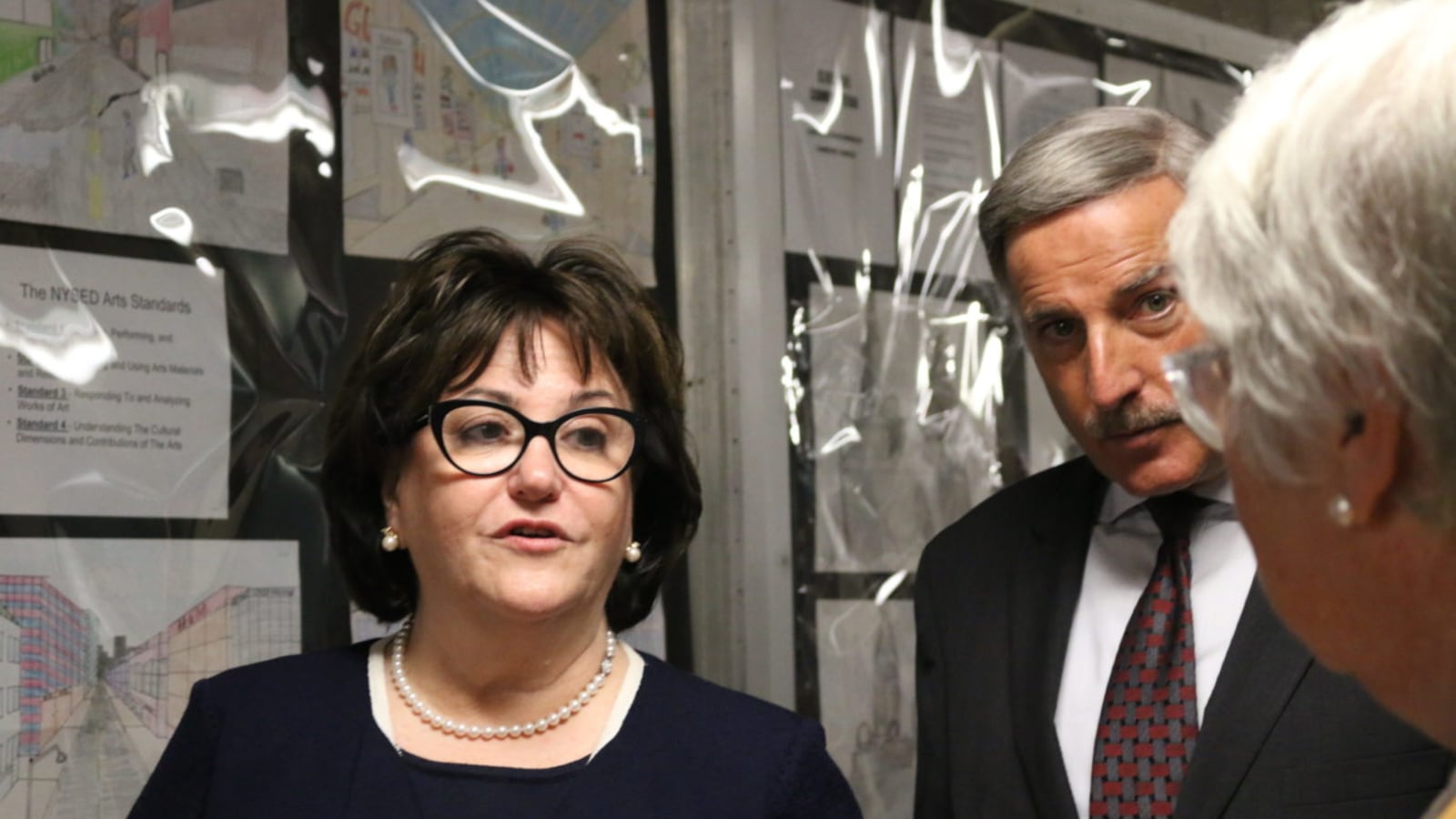New York’s education policymakers got a lesson Monday in how treacherous it will to be revamp the state’s highly controversial teacher-evaluation system.
Just minutes after the state education commissioner laid out a detailed plan for coming up with a redesigned system by fall of 2019, a state teachers-union official rebuffed it. Arguing that teachers cannot wait another year for fixes to a rating system they say is fatally flawed, the union will ask lawmakers to change the underlying evaluation law this year, the official said.
In fact, she said, the union won’t even ask its members to take a department survey meant to gather feedback on the current system, which rates teachers based on classroom observations and other measures of what students are learning.
“First and foremost, the teachers that we represent believe that the time to fix [teacher evaluation] is this year,” said Jolene DiBrango, executive vice president of the New York State United Teachers, in a conversation with reporters after the state outlined its plan. “Now is the time — we’ve been talking about this for years.”
Even as state policymakers face political opposition from the teachers union — which has long opposed using state test scores to judge teachers, as was required by a 2015 state law — they are likely to run into practical challenges as well.
Any effort to come up with statewide alternative assessments to use in evaluations could prove too costly at a time of fiscal uncertainty for the state. And major changes to the system could require reopening the evaluation law, which sparked a fierce backlash when it was passed. So far, lawmakers have not indicated that doing so is a priority, and Gov. Andrew Cuomo may want to avoid such drama during an election year.
“We have lived in a very toxic landscape,” Board of Regents Chancellor Betty Rosa said Monday during the Regents’ monthly meeting, where state officials laid out their redesign plan. “I think that we have to be so mindful and so strategic and so intentional in our plan.”
The 2015 law — which Cuomo aggressively pushed for after calling the previous evaluation system “baloney” — weakened the role of local districts and teachers unions in crafting teacher ratings, instead shifting more authority to the state. That opened the door for ratings that relied much more heavily on student test scores — a move fiercely opposed by the unions, which worked to fuel the state’s massive parent-led boycott of the state exams.
In response to the backlash, the Board of Regents placed a moratorium on the use of grades 3-8 math and English tests in teacher evaluations until 2019. Instead, districts must find different measures of teacher effectiveness.
But now, the teachers union wants to repeal the state law entirely, and return evaluations back to local districts. Doing so would allow educators to help design systems that take into account unique conditions in each district — and to likely greatly reduce or eliminate the role of test scores in teacher ratings.
“We believe local control is the key,” DiBrango said. “What will work in one school district will not work in another.”
State Education Commissioner MaryEllen Elia did not rule out returning control of evaluations back to districts. But the lengthy redesign plan she laid Monday seemed aimed at improving the statewide system.
The state will form two redesign workgroups, state officials said. One will concentrate on the components of evaluations, including whether there should be classroom observations, tests, or other ways to judge teachers — and how much weight to give each part. The other group will focus on how student learning is measured, which may include developing new tests.
The education department will also continue to collect feedback from teachers through a survey, which 9,000 educators have already completed. However, DiBrango said the union will not encourage any additional teachers to take the survey in part because they were not consulted about the survey questions, which she said leads teachers into choosing among predetermined ways to evaluate them.
“We have not encouraged our teachers to necessarily take the survey if they don’t want to,” DiBrango said. “They have free will, so certainly some will take it and some will choose not to.”
As the union and the education department pursue their competing plans, the legislature could prove to be a serious roadblock.
Cuomo and state lawmakers have indicated that their top focus this legislative session is beating back funding cuts from Washington — not revisiting a deeply controversial law that is technically on hold until the moratorium ends next year.
On Monday, Elia suggested that her department may be able to make certain adjustments to the evaluation system without changing the law. Still, any major changes would likely require a new law. However, the department’s plan to present its redesign proposal by spring 2019 would give lawmakers little time to debate the proposed changes before the end of their legislative session.
Even if department officials could get lawmakers on board, a new evaluation system — with new tests — could prove too costly to adopt.
Officials recently said they would not join a federal program to create alternative state assessments because it would cost too much. On Monday, Elia said any new tests tied to teacher evaluations wouldn’t necessarily have to be given to as many students as the annual state exams, so they may be less costly.
Still, Regent Judith Chin, who chairs the board’s workgroup that focuses on standards and assessments, questioned whether the state could feasibly create a whole new set of tests to use for teacher ratings that would be ready for the 2019 school year.
“Is it realistic that we could build that capacity in a short period of time?” Chin asked.

